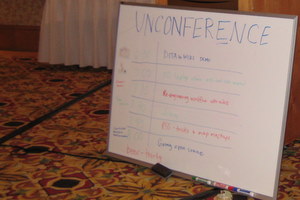
In a word – energizing! I had completed my two shared talks – the Wiki roundtripping talk at 2 in the afternoon, with the next talk being at 3:30 when I moderated the Meet the bloggers panel. I had been on my feet for nearly all of both talks, and I was tiring mentally as well as physically. But the informal freestyle nature of the unconference was just what I needed to finish up my day.
Here’s how it “went down.” After the Meet the bloggers panel, Lisa Dyer and I started writing the “presentation” titles from the wiki page onto a white board and placed it outside the unconference room about an hour before the 6:30 start. I talked to people who came up and had questions about it, and also lamented the fact that we were at the same time as the Vancouver STC meeting, which was going to be held in the room next door to ours. Last week I sent their president an email apologizing for the scheduling, saying that they would have been such a fun group to unconference with! So, note to self, if I ever do an unconference again, try to match up with the locals’ schedule.

We had about fifteen people to start with people coming and going. We had problems with the overhead projector, but pulled it together finally on Lisa’s laptop. She demonstrated her DITA to Confluence wiki build process, and said that she’s ready to get it bundled up as an Enterprise Wiki plug-in if there’s enough outside interest. She needs to get resources for the final steps of getting it ready but it sounds like she’ll be able to do that. Lisa has had DITA in production for four years and the DITA-to-wiki workflow in place for over a year now. That plug-in should be valuable as a tool for making structured authoring work for wiki output.
I presented the wiki-based documentation used for the XO laptop simplified user guide, showing both the wiki.laptop.org one-page version as well as the flossmanuals.net wiki version that also has a PDF output. I wanted to demonstrate the Sugar operating system using my Dell laptop in emulation, but I couldn’t get my laptop to display on the overhead projector. The same thing happened at the earlier afternoon wiki presentation, darn it, but fortunately Stewart Mader set us up on his Macbook for that preso. Yay Mac. 🙂 I also spoke with a localization expert who may have ideas for tapping into the translator communities that would like to work on documentation translations for the OLPC. That is an exciting outcome.
Stewart Mader did a neat mini-workshop-type session where he asked us all to share our daily tasks when working on documentation, and then we each brainstormed about the bottlenecks for each task. For example, I often read what are essentially threaded discussions in our bug tracking tool to try to determine what’s changed and whether the change affects documentation. A bottleneck is often the time it takes to read through the threads. We talked a little bit about how wikis are a better collection for information sometimes than threaded discussions – not that a wiki is the fix in my particular case, but it was good to recognize a threaded pattern and know its limitations.
Tom Johnson did two quick demonstrations of Woopra, a blog statistics tool that helps you communicate with your blog’s readers while they’re viewing your blog. Someone from New Dehli, India, was viewing his site while we were unconferencing! But he or she didn’t respond to Tom’s initial Instant-Message-like talk request. Next he showed us the marvelously simple and easy to use screencasting software, Jing. This bright little sun icon appears over your desktop and you just plug in your microphone if you want to record sound, click the little sun, drag the cursor to define the area of the screen you want to record, and you’re screencasting! Very handy, very free tool (so far.)
Alan Porter had something come up so that he couldn’t present his publishing-doesn’t-have-to-be-last scenario, and I originally thought I’d fill in with some stupid RSS tricks, but we decided we didn’t need to fill in the time and the beer-thirty hour was approaching. 🙂 So, for posterity’s sake, here are the RSS tricks I know:
- Get updates from podcasts and video sites.
- Get the “buzz” on blogosphere via RSS – aggregation of information is crucial for this
- Notifications on classified ads for specific search words (craigslist has this, and I’ve often used to to seek Thomas the Tank Engine goodies)
- Track group conversations via RSS instead of email (such as Yahoo Groups, which offers RSS feeds for conversations)
- Do package tracking (nifty! especially for ebay resellers she says this is a useful tool)
- Receive product newsletters (again, RSS as an email alternative)
- Job listings aggregation using keyword searches and a location limiter (indeed.com)
- Use on calendars to get notification for birthdays, anniversaries, etc.
- Subscribe to RSS feeds from higher education institutes to get notification for course information
- Get RSS results of searches for competitive intelligence and other specialized information, such as subscribing to a feed that searches for Anne Gentle or Ann Gentle (and I should probably add Anne Gentile, ha ha!)
As our finale, Scott Nesbitt and Aaron Davis presented about Open Source Software’s uses for creating documentation deliverables and it was an engaging little back-and-forth dialog between the two of them, much in the style of their entirely enjoyable podcasts on DMN Communications!